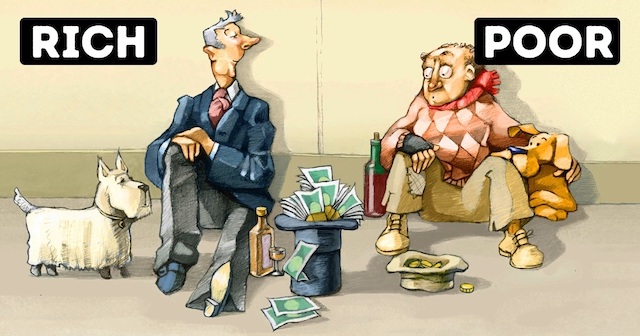 Wealth inequality has become a major talking point for those primarily on the Left who are vehemently against capitalism. Often espoused by leftist professors, lawmakers, and think tanks, the increasing disparity in wealth among Americans has been a growing concern. Many have questioned for years whether the Federal Reserve and their fiat currency monetary system is a fundamental fraud in our economy today. Is the Federal Reserve causing wealth inequality, thereby sowing the seeds of Marxism?
Wealth inequality has become a major talking point for those primarily on the Left who are vehemently against capitalism. Often espoused by leftist professors, lawmakers, and think tanks, the increasing disparity in wealth among Americans has been a growing concern. Many have questioned for years whether the Federal Reserve and their fiat currency monetary system is a fundamental fraud in our economy today. Is the Federal Reserve causing wealth inequality, thereby sowing the seeds of Marxism?
Wealth inequality is an issue that both political sides should be willing to tackle because it can cause terrible consequences for a cohesive society. One can easily go off on the issues of personal responsibility and envy politics, but the reality is society must deal with the issue regardless of the morality of the issues – see “Trapped on a Deserted Island with 200 Hungry Savages.” While the Left is correct in their concerns, they are ignoring a major cause of the rampant, growing inequality in America – currency debasement and instead blame capitalism. Let’s take a simple example that demonstrates Fiat Currency Debasement and how it can create wealth inequality mathematically.
In our hypothetical example, let’s take a simple real estate rental property asset (there are more sophisticated financial products on the markets that can do the same) vs. a Common person who merely places their money in a bank. Our starting financial position (rounded numbers for ease of explanation):
Smart investor:
* We purchase the property for $100,000.
* We place a 10% down payment of $10,000.
* At a 3% mortgage rate with taxes and insurance, we must pay $500 per month.
* We rent the property for $525 per month for the year.
The Common person:
* Places $10,000 in the bank, and we will give them a full 3% annual return on their money.
Results: Our smart investor’s net wealth position after a year is $10,300. The Common person is the same.
Now let’s advance the clock one year (normally this period would be longer to not make the scam so obvious) and assume a 50% currency debasement (or 100% price inflation). Here is what the financial position looks like now:
Smart investor:
* Property value is $200,000 – less the original mortgage; the net is $110,000.
* We now rent the property for $1050 – this yields a net (assuming no increases in tax and insurance) of 6,600 for the year.
The Common person:
* Earns a 3% annual compounded interest return on their money – the investor still has the original $10,000.
Results after the two years: Our Smart investor’s net wealth position is $116,600. The Common person now has $10,609. Then we have to adjust downward (50%) for the net inflation-adjusted amounts of: for the Smart investor $58,300 and for the Common person $5,345.
Voila … wealth inequality. Note that in both the Smart and Common person investors, starting with the same amount of capital, neither added no value other than capital. One may say, but the Smart investor took risks. Partially true, and would deserve a higher return on capital – but to what extent? The risk should already be built into the asset purchase price, rental market value returns, and the borrowing interest rate within a truly free market. And is it much of a risk to know politicians will debase the currency? Then there is the issue of fractional reserve lending – often called financial leverage. In and of itself this is not necessarily bad. But when combined with the Fiat Currency Debasement, it provides the necessary tools to create this wealth inequality. It borrows money at today’s value and repaying tomorrow with deflated money.
Without currency debasement, the Smart investor would have never made the tenfold gains, compared to the Common person. At a greater economic level, those (bottom 50% have nothing) that can not even match the Smart investor’s capital commitment, can not even participate in the economy to gain wealth. Obviously, the amount of capital one has is the degree one can participate. Hence, this currency debasement is a distortion in the economy that favors one group over another. This is not a free market with equal opportunity for all. Under a fixed monetary system, this advantage goes away – the rules of the game do matter.
One can easily see this expanding wealth inequality that started in the 1970s when the U.S. went from a fixed monetary system to a fiat currency system – which now allows one to debase the currency. President Richard Nixon’s actions in 1971 to end dollar convertibility to gold and implement wage/price controls were intended to address the international dilemma of a looming gold run and the domestic problem of inflation. Many attribute the gold run due to the U.S. expansion of its federal budget, driven by the Vietnam war and the war on poverty expenditures in prior years.
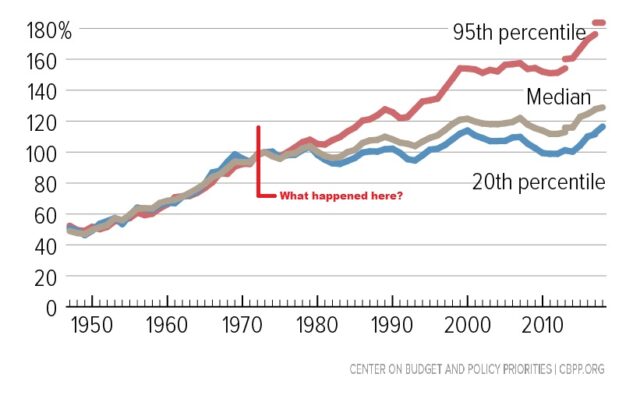
How does one calculate the value of money? Has not the Dollar rates been reasonably stable against other major currencies? They have. But this is not the correct measure. For example, the Euro Dollar rate has been oscillating around the same levels for some time now. The issue here is that all central banks are playing the same game, and they are all devaluing mostly at similar rates. In other words, relative to each other, the rates are reasonably stable; most currencies are all falling at near the same rate – giving the appearance of stability. Though there are many issues in the valuation of a currency, here is a very high-level rule of thumb formula:
Currency Value = GDP / Money Supply
With this simple formula, one can see that if both GDP and Money Supply rise at the same rate, the Currency Value will remain stable. Adjust one side or the other of this equation, will adjust currency valuations accordingly. But one hears that reports like employment, inflation, government budgets, and interest rate movements can affect currency valuations as well. Yes, this is because these reports are early warning signals that can affect the final outcomes of the GDP and Money Supply components of the formula.
Take a look at the chart below and see this phenomenon in action. The broader measure of Money Supply growth has been around 5% between 2012 to 2019. With GDP rates of between 2 and 3%, this means about a 2% currency debasement rate – which also just so happens to be the Fed inflation target rate. Since Coronavirus, the measurements have gone whacky. GDP rates have dropped to less than -5%, and as you can see below, the Money Supply growth rate is near 30%. This is horrific, though it may be transitory. A single quarter or even a couple quarters is not the average, and the ship can be righted. But if the current situation is not recovered very soon, do the math – we could be conservatively looking at a dramatic currency debasement in excess of 20% within a year.
Listen to the rhetoric of Democrats under Joe Biden. The future could be frightening. Green New Deals, Universal free Health Care, college debt forgiveness, free universities, and a whole host of other Lefty items, would blow out government budgets and increase Money Supply with little GDP growth to show for it. Especially if Democrats hold back GDP growth with endless Coronavirus economic restrictions. Runaway inflation’s ugly head could reemerge after decades of hiding. The sad reality is the Democrat policies would exacerbate wealth inequality, not reduce it. One could assert that “IF” this scenario would occur, be prepared to have a 20 to 50% reduction of your standard of living over the next 2 to 5 years. Then think of the horrors of extending the fertile ground for Marxism to grow.
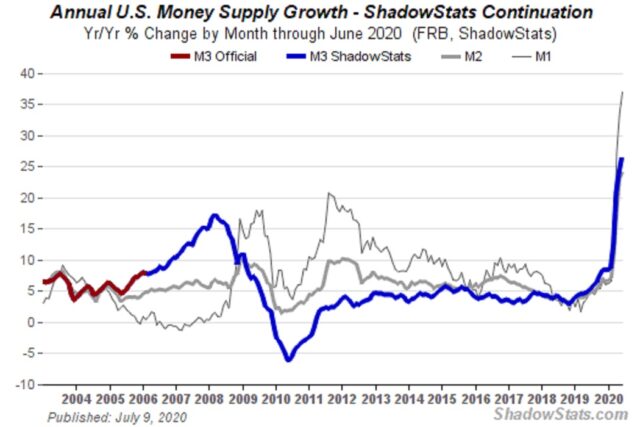
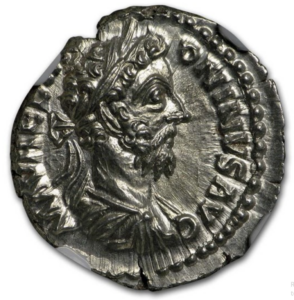
M. Aurelius (161-180 AD)
There is an endpoint to all this. Just ask the Romans. Roman officials found a way to make currency debase. By decreasing the purity of their coinage, they were able to make more “silver” coins with the same face value. With more coins in circulation, the government could spend more. And so, the content of silver dropped over the years. By the time of Marcus Aurelius, the denarius was only about 75% silver. Caracalla tried a different method of debasement. He introduced the “double denarius,”

Denarius Gallienus
which was worth 2x the denarius in face value. However, it had only the weight of 1.5 denarii. By the time of Gallienus, the coins had barely 5% silver. Each coin was a bronze core with a thin coating of silver.
The shine quickly wore off to reveal the poor quality underneath. Hyperinflation, soaring taxes, and worthless money created a trifecta that dissolved much of Rome’s trade. The economy was paralyzed. By the end of the 3rd century, any trade that was left was mostly local, using inefficient barter methods instead of any meaningful medium of exchange.
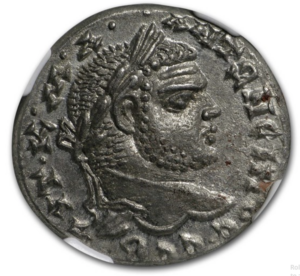
Tetradrachm Caracalla (198-217 AD)
The Romans played the game of currency debasement, all the way to the end until their empire collapsed. We have seen this as well with other smaller countries around the world today – Zimbabwe and Venezuela, to name a couple. So the currency debasement trick of many elites and their governments is a well-established method to rob the people for millennia.
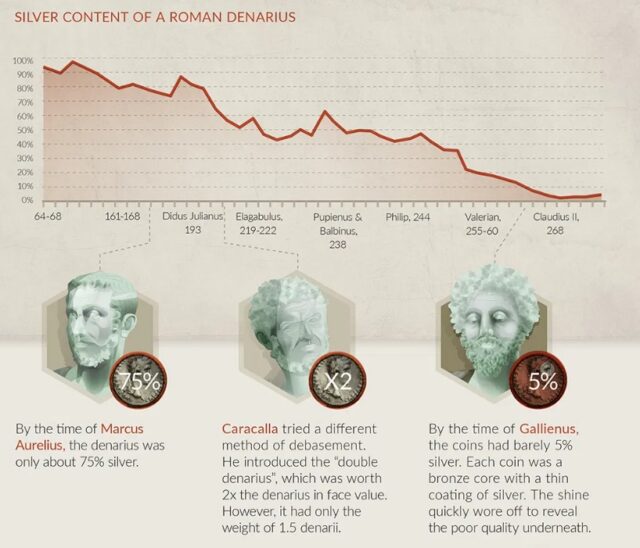
Solutions? Massive socialist redistribution schemes? No! This would just make it worse via exploding government budgets. Quite simply – return to a fixed monetary system. This does not necessarily mean currencies need to be gold-backed or even a fixed currency that never expands. It merely means that one can not allow the money supply to grow in far excess of GDP growth – which causes the currency debasement in the first place. It also means government expenditures must stay in line with tax revenues. Balanced budgets are something politicians would obviously hate, as they would no longer be able to scheme to buy votes today at the expense of tomorrow.
Do elites understand this scheme? Sure they do. Most common people do not. Unfortunately, the common people do not look far enough into the future and focus on today’s money and whatever they can get immediately from the government. Understanding this phenomenon puts today’s events into perspective. As wealth inequality rises, for sure Marxist envy politics can become very attractive to the common people. If we do not fix this problem, for sure, Marxism will take root.
Furthermore, instead of wallowing in class warfare, it is better for elites to divert the attention away from the real issues and get people fighting over race. Politically it is not a good argument to attack producers – it is part of the American work ethic. Better to talk about “systemic racism.” It’s an easier sell. This explains why so many elites are Leftists … it is a good scam to keep them in their positions of wealth and power.

Remember the legend of Payasam at Ambalappuzha? The king made a deal with the traveling sage that the king thought was a good deal – at least in the short run. It goes something like this – for my payment, give me one grain of rice on the first square of this chessboard, then two grains on the second square, four grains on the third square, eight grains on the fourth square and so on, so that each square contains double the amount of rice of the previous square. The total number of grains of rice needed to fill the chessboard would have been 18 quintillion grains of rice, which would weigh approximately 210 billion tonnes and would be enough rice to cover the entire country of India with a meter high layer of rice. Obviously, the king did not understand the math, and the scheme was not hidden, it was in plain sight.
There is a reason when Thomas Jefferson said, “Big banks are more dangerous than standing armies, and the practice of borrowing and spending money to be paid back by the next generation is stealing from their future.” Many are quick to bash banks. Even the Federal Reserve – citing conspiracy theories of the Illuminati, the Rockefellers, and various other groups. You have heard it before, “There is no Federal in Federal Reserve.” It is a private agency used by the government. All this may be true. But it is also true that central banks, banks, and financial service companies do provide needed services. The scam is not just this – it is rather a small part – it is not just the institution rather its policies. It is the scam right in front of your face that is the most harmful. It is the ignorance of not understanding the basic math of Fiat Currency Debasement.
Is the Federal Reserve sowing seeds of Marxism? The simple answer is yes, though one may debate whether knowingly or not. The Federal Reserve is like many organizations, they take on a life of their own and grows, perhaps initially thinking they are doing good. Today their policies could be just one of “extend and pretend” and hope the music does not stop on their watch. Or perhaps it is all nefarious – at least at the top level. Either way, the end results are the same. But the Federal Reserve gets its authority from our politicians and ultimately from those who voted for them.
President Trump understands well this monetary system dynamic. After all, he is a real estate magnate. Trump has, in the past, talked about “Sound Money.” Trump has had little to say about sound money since the election. Trump has been focused in his first term on draining the swamp and trade. Perhaps in a second term, this may come into focus. There is a trifecta of economic, moral hazard, Fiat Currency Debasement, trade, and government-corporate corruption. More on these other moral hazard issues in the future.
So just how much moral hazard has Fiat Currency Debasement distorted our economy today? This would be a hard number to come by, but using the wealth inequality chart of this article, and just using the gage of your eyes, project a more linear line in terms of wealth inequality (since the mid-1970s) on an more equal basis. One could say that this moral hazard could be as high as 30% – understanding that the growth of wealth inequality is expanding each year. Median family income in inflation-adjusted dollars has not moved a lot in 50 years. Jut think what an additional 30% would do in building the middle class – adding support for free-market capitalism. And yes, the rich would still be rich – just with a narrower gap. Having a more vibrant middle-class would also help all economic classes to move up.
A caution to both our major political parties – if Fiat Currency Debasement is not handled in an effective way, the dark cloud of social dis-cohesion and Marxism will lift its ugly head.
Once you understand well Fiat Currency Debasement, all the events of today start to fall into place.
Written by Blue Agent007 for Right Wire Report ~ July 15, 2020

Start buying gold, silver and other hard assents, to preserve your wealth. There may be ups and downs in the price of these metals, but they will always retain their value. Gold and silver IS money. So start buying some now,. Start with an ounce a month for gold and 20 ounces a month for silver. You need to start doing this as soon as possible. ~ Jeffrey Bennett, Kettle Moraine, Ltd. for Morgana Precious Metals (https://morganapreciousmetals.com).